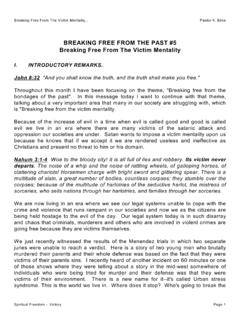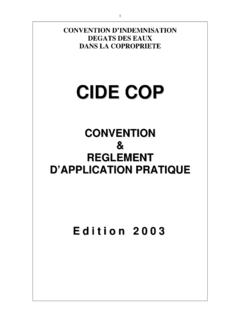Transcription of Revisiting The 24 Defenses Of The Guarantor — 24 Years …
1 The Practical Real Estate Lawyer | 9 Joshua Stein and Elaine WangGuaranties still raise plenty of issues and concerns for coMMercial real estate loans rely on personal guaranties. Those guaranties usu-ally cover only certain obligations of the borrower. Sometimes, they cover all loan obligations or at least a meaningful part of the principal indebtedness. (Par-tial principal guaranties merit an article, or perhaps a book, of their own. They raise a panoply of issues about the interaction between paydowns (voluntary or involuntary) and the scope of a Guarantor s expo-sure. The outcomes of those legal issues often do not conform to the parties business expectations, and those expectations are often murky in any case.) Re-gardless of what guaranties cover, however, lenders want to know the courts will enforce them and that lenders won t face unpleasant surprises in court.
2 Guaranties have played a significant role yet again in some of the loan enforcement litigation spawned by the recent financial meltdown. Lenders and sometimes guarantors have (re)learned about pit-falls in enforcing guaranties. And when lenders work out troubled loans instead of enforcing them, lenders sometimes have a chance to improve the language of their guaranties, and borrowers may be called upon to provide new or improved Stein is a member of the American College of Real Estate Lawyers and former chair of the New York State Bar Association Real Property Law Section. In 2011, he was elected to membership in the Anglo American Real Property Institute. He has written five books and over 200 articles on commer-cial real estate law and practice. He is the sole principal of Joshua Stein Wang is an associate in the Finance Department in the New York office of Latham & Watkins LLP.
3 Her practice focuses on all aspects of commercial real estate law, including commercial leasing, commercial acquisitions and dis-positions, development projects, and real estate financing, as well as the real estate aspects of mergers and acquisitions, project finance, leveraged finance, and secured high yield article is based on and updates The 24 Defenses of the Guaran-tor (pts. 1-3), Secured Lending Alert ( 1987-88) by Barkley Clark and Barbara Clark, authors of Clarks Secured Transactions Monthly and The Law of Secured Transactions Under the UCC. The authors of today s article thank the authors of the earlier series of articles and Pratt & Sons, publisher of that earlier series, for consenting to the publication of this article, which uses the 1987 series as its starting point and would probably otherwise violate copyright. The authors of today s article also thank Sean Weisberg, New York University Law School class of 2012; Robert J.
4 Gorrie, Pace Law School class of 2012; and Alfredo R. Lagamon, Jr. of Ernst & Young, for their helpful editorial comments. Blame only today s named co-authors for any mistakes in today s article, how-ever. Copyright 2012 Joshua Stein and Elaine Wang. The authors consent to any copying, updating, and adaptation of this article, but only starting 24 Years after The 24 Defenses Of The Guarantor 24 Years Later10 | The Practical Real Estate Lawyer January 2012 Whether for new loans or for enforcement or workouts of old loans, lenders and their counsel approach guaranties knowing that for decades the courts have protected any Guarantor (sometimes called the fool with a pen ) by upholding Defenses that allow the Guarantor to disclaim liability. In the late 1980s, articles in three issues of the Secured Lending Alert newsletter highlighted 24 Defenses that guarantors often raise when a lender tries to enforce a guaranty.
5 The 24 Defenses of the Guarantor (pts. 1-3), Secured Lending Alert ( 1987-88). Those common Defenses fell into five general groups: Basic contract law; Disclosure; Scope-of-risk; Primary obligation; and Bankruptcy. Each defense can potentially derail or delay enforcement of the guaranty, thus producing counterintui-tive results for the lender. Careful drafting can protect a lender from many of these Defenses . This article seeks to revisit each of the 24 Defenses highlighted 24 Years ago; update some drafting strategies to respond to each defense ; ana-lyze which Defenses remain particularly important, given case law since 1987; and augment the discussion with further suggestions about how to negotiate, draft, and administer any guaranty. As with any other drafting or legal suggestions, the suggestions offered here must always be adjusted to take into account the circumstances of each specific transaction.
6 All sample language offered in this article assumes the guaranty has already defined the terms Borrower, Guarantor , Guaranty, Insolvency Proceeding, Lender, Loan, Loan Documents, and Obligations. Anyone using sample language, from this article or anywhere else, always must confirm such assumptions and edit accordingly just one obvious example of why and how one cannot merely shovel words from one wordpile to another when using someone else s sample language. The suggestions in this article look at the world from a lender s per-spective and do not consider how a Guarantor or borrower might seek to push back against, or fine-tune, the language offered here. As a final caveat, the outcome of any particular dispute will depend on the facts of that case and the discretion of the particular court. Thus, nothing is 1: lack of an enforceable GuarantyA Guarantor s first defense consists of a general meeting of the minds defense , grounded in basic con-tract law.
7 It is the Guarantor s most fundamental defense , based on the theory that the transaction lacked enough mutual assent and agreement to form an enforceable contract. This defense rarely succeeds for sophisticated corporate (or other business entity) guarantors. For an individual Guarantor , particularly if unsophisticated, it can carry more weight. If the individual does not engage separate counsel whether by strategy or happenstance that may also support the argument for lack of tip: Write the guaranty in plain English. Make sure the Guarantor receives a copy of the guaranty, and acknowledges that. Finally, give the Guarantor an opportunity to review the agreement and ask ques-24 Defenses | 11tions, as the language in many guaranties is often archaic and incomprehensible to mere mortals. Consider having the Guarantor acknowledge representation by counsel. Sample Language: Guarantor acknowledges that before executing this Guaranty: (a) Guarantor has had the opportunity to review it with counsel of Guarantor s choice; (b) Lender has recommended that Guaran-tor obtain separate counsel, independent of Borrower s counsel, for this Guaranty; and (c) Guarantor has carefully read this Guaranty and understood the meaning and effect of its terms.
8 defense 2: no considerationAny guaranty, almost by definition, invites the Guarantor to claim lack of consideration as a defense . That s because the Guarantor does not receive loan proceeds directly , the Guarantor receives no direct benefit for signing the guaranty. Or at least it looks that way, to anyone who just looks at the surface of the transaction and tries not to think too hard. Courts have, however, long held that a lender s extension of credit to the primary obligor provides enough consideration for a guaranty signed at the same time. See Jenista v. Burlington N., 388 770, 773 (Minn. Ct. App. 1986) (guaranty supported by consideration because lender suffered detriment by extend-ing credit to debtor). In the case of a forbearance guaranty where a Guarantor signs a guaranty of an existing loan to persuade the lender to forbear from enforcement the failure of consideration defense may carry a bit more tip: The recitals to the guaranty should recite and substantiate delivery of consideration for the guaranty.
9 Example: Guarantor executes and delivers this Guaranty in consideration of, and to induce, Lender s extension of credit to Borrower. Guarantor acknowledges that Lender would not have extended such credit but for this Guaranty. In the usual case, in which the Guarantor will in fact very much benefit from the credit to the borrower, because the Guarantor owns a substantial interest in the borrower, also say: Guarantor will derive substantial benefits from the Loan, because Guarantor owns a substantial equity interest in Borrower. In the case of a forbearance guaranty, add a statement like this: Guarantor delivers this Guaranty to induce Lender to forbear from enforcing its rights and remedies against Borrower. That forbearance will benefit Guarantor , as a substantial equity owner of Borrower. At the end of the recitals, perhaps say it again: 12 | The Practical Real Estate Lawyer January 2012 NOW, THEREFORE, in consideration of the foregoing recitals, and for good, adequate, and valuable consideration, receipt of which Guarantor acknowledges, Guarantor defense 3: statute of FraudsEver since at least the original English Statute of Frauds, enacted in 1677, contracts of guaranty have need-ed to be in writing.
10 Oral guaranties give guarantors a free ticket to unenforceability. Thus, no sane lender should (or would) rely on a phone call or a memorandum that is not signed by the Guarantor . The validity of an email as a writing represents a still-developing area of the law, and no lender wants to contribute to that developmental process. If a guaranty comes from an entity, counsel should also think about issues of authority and execution, just as if the guaranty were a loan document executed by a primary no. 4: statute of limitationsDepending on state law, the same statute of limitations that governs written agreements in general will also usually govern guaranties. But when does the clock start to tick? Usually, as soon as the underlying debt is payable. For a promissory note, that means the maturity date. If the lender accelerates the note, then this could accelerate commencement of the limitations period.









